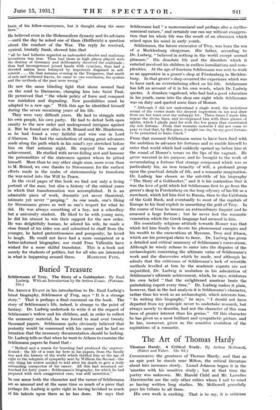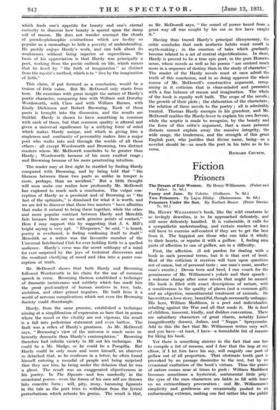The Art of Thomas Hardy
Thomas Hardy. A Critical Study. By Arthur McDowell. (Faber and Faber. 12s. ed.) CONSIDERING the greatness of Thomas Hardy, and that as an epic poet he stands near Milton, the critical literature about him increases slowly. Lionel Johnson began it in the 'nineties with his sensitive study ; but at that time the poetry was unknown. Mr. Harold Child and Mr. Lascelles Abercrombie are the only other critics whom I call to mind as having written long studies. Mr. McDowell gracefully pays his tribute to all three.
His own work is exciting. That is to say, it is criticism which feeds one's appetite for beauty and one's eternal curiosity to discover how beauty is spored upon the damp soil of reason. He does not wander amongst the clouds of pseudo-philosophic abstractions which are to-day so popular as a camouflage to hide a poverty of understanding. He gustily enjoys Hardy's work, and can talk about its weaknesses without being superior or supercilious. The basis of his appreciation is that Hardy was principally a poet, working from the poetic outlook on life, which means that he lived by " the faith of imagination " as distinct from the mystic's method, which is to " live by the imagination of faith."
This claim, if put forward as a conclusion, would be a truism of little value. But Mr. McDowell only starts from here. He examines with great insight the nature of Hardy's poetic character, comparing him with William and Dorothy Wordsworth, with Clare and with William Barnes, with Emily Dickinson and Robert Browning. Each of these poets is brought into the discussion, and the results are fruitful. Hardy is shown to have something in common with each of them, but that common quality is altered and given a universal significance by a unifying force of mind which makes Hardy unique, and which in giving him a singleness and continuity of personality makes him a major poet who walks into and through the worlds of all those others : all except Wordsworth and Browning, two distinct masters whom Mr. McDowell concludes to be greater than Hardy ; Wordsworth because of his more exalted range ; and Browning because of his more penetrating intuition.
The reader may at first sight be startled by finding Hardy compared with Browning, and by being told that " the likeness between these two poets so unlike in temper is more, perhaps, than an accident." But a little thought will soon make one realize how profoundly Mr. McDowell has explored to reach such a conclusion. The vulgar con- ception of Hardy as a pessimist and of Browning as " the last of the optimists," is dismissed for what it is worth, and we are led to discover that these two masters " have affinities that make it natural to bring them together, while the other and more popular contrast between Hardy and Meredith fails because there are no such genuine points of contact." Here I may support this by suggesting that J. S. Mill's bright saying is very apt. " Eloquence," he said, " is heard, poetry is overheard, is feeling confessing itself to itself." Meredith as a writer was the favourite member of the Universal Intellectual Club for ever holding forth to a quelled audience. Hardy's verse was the secret soliloquy of a mind for ever surprised by the joys of technical discoveries and the resultant clarifying of mood and idea into a purer con- ception of truth.
Mr. McDowell shows that both Hardy and Browning followed Wordsworth in his claim for the use of common
• speech in verse. Browning thereon established a technique of dramatic incisiveness -and subtlety which has made him the great poet-analyst of human- motives in love, hate, .ambition, and other primal impulses. He built from it a
• world of nervous complications which not even the BroWning Society could disentangle. '
Hardy, from the same premise, established a technique aiming at a simplification of expression so bare that in poems where the mood or the vitality are not vigorous, the result is a fall into pedestrian statement and even bathos. The fault was a reflex of Hardy's greatness. As Mr. McDowell says, " Browning's view of the universe is much more in- herently dramatic than Hardy's contemplation." Browning therefore had infinite variety to fill out his technique. He could be a Mr. Sludge, or he could be a Pompilia, But Hardy could be only more and more himself, an observer so detached that, as he confesses in a letter, he often found Himself entering a roomful of people and being surprised that they saw him, he being under the delusion that- he was a ghost. The result was an exaggerated objectiveness in 'hiS poetry. In The Dynasts—and less markedly in the 'occasional poems—even the forces of his own self are thrown into concrete form ; will; pity, irony, becoming figments ill the tale as the poet tries to withdraw from the lyrical perturbations which actuate his geniuis. " The result is that,
as Mr. McDowell says, " the sound of power- heard from a great way off was caught by his ear as few have caught it."
Having thus traced Hardy's principal idiosyncrasy, the critic concludes that such aesthetic habits must result in myth-making ; in the creation of tales which gradually become related to a set of central objectification. In short, Hardy is proved to be a true epic poet, in the pure Homeric sense, whose novels as well as his poems " are centred much more in a sequence of destiny than in the study of character." The reader of the Hardy novels must at once admit the truth of this conclusion, and in so doing approve the whole course of Mr. McDowell's constructive argument, recog- nizing in it criticism that is clear-minded and presented with a fine balance of reason and imagination. The whole of the book is equally well built. The scope of the novels ; the'growth of their plots ; the elaboration of the characters ; the relation of these novels to the poetry ; all is admirably treated. Thomas Hardy emerges in his grandeur, and Mr. McDowell enables the Hardy-lover to eXplain his own fervour, while the sceptic is made to recognize, by the beauty and the force of this critic's argument, that a mere personal distaste cannot explain away the massive integrity, the wide range, the tenderness, and the strength of this great English poet, who justifies that divine name, being—as a novelist should be—as much the poet in his tales as in his verse.
RICHARD CHURCH.







































 Previous page
Previous page